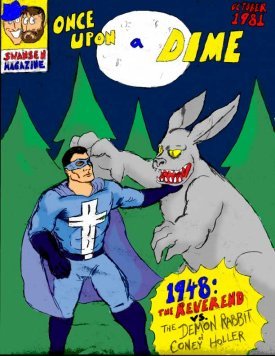|
Defender of the Southern
Faith: When Walked The Reverend...
Garcia
doesn't just write for us, oh, no. He's been pitching and
publishing to 'zines for years. A couple of decades, in fact.
So when flipping through some back issues of Once Upon A Dime
that Donald Swan loaned me for the online project, I knew
that I had to find something by Chris. Here's an excerpt,
with the full article being over on Once
Upon A Dime.com.
Of all
the characters that have graced the shelves of grocery stores
and newsstands the world over, none captured the feel of the
post-bellum South so much as The Reverend. From the cross
that burned on his chest when evil approached, to the eyes
of the demons that he battled tooth and nail, The Reverend's
seven-year run made him a favorite of children around the
country, but especially those who read beneath the covers
in former Georgia plantation homes.
The Reverend,
written originally by Hap Hanland, appeared for the first
time on the back page of In Your Defense, a popular
American war comic, during the early months of WWII. Shown
defending the stately homes of Savannah from Japanese air
attack, The Reverend came to the rescue, and flew off with
the cry "always keep the faith!"
Returning
as the main feature in Fighting Tales #17, The Reverend
accompanied a young Atlanta man across the ocean in his battle
against Uncle Fritz, saving him and several of his platoon
mates from heavy fire at the hands of the Germans, before
performing a mass baptism that made the Gerries lay down their
arms. No issue of any wartime comic had approached the sales
level of Fighting Tales #17, and it served as the catalyst
to turn The Reverend into the star of American Victory
comics.
American
Victory had been a low-selling title featuring the adventures
of Mr. Excelsior, the Harvard professor turned crime fighter
who would make daily flights to Europe or Japan to save our
boys.
Once the
jump-suited and masked Reverend replaced the aging academic
as the star, sales jumped greatly, particularly in the South,
where The Reverend spent most of his time routing out draft
dodgers and stopping Germans from infiltrating the social
set. The Reverend rarely handed out true beatings, usually
preferring to give wrongdoers a second chance at redemption.
The Reverend,
the alter ego of Bible publishing tycoon James Strong, had
powers that allowed him to serve both his Southern brethren
and the effort abroad. Immune to the bullets fired by the
foreign menaces then at war with the U.S., The Reverend could
call forth his Armor of God to take the heavy fire. His early
adventures frequently took him over-seas, trips aided by his
powers of flight and super-vision. He could call forth his
cross to show the light of truth to any non-believer.
One of
his frequently used powers, "Absolution," allowed
many villains to be forgiven, often breaking into tears and
taking holy orders in the next frame. His greatest power,
Hanland claimed, was his compassionate wisdom that allowed
him to bring people together.
"I
wrote the Reverend to be the greatest hero ever, not only
in strength, but in judgment." The now 87-year old Hanland
said in a rare convention appearance this year. "He would
defend the South with great pride, encourage sweet Southern
children to say their prayers and train hard to defeat the
transoceanic threats to our country and his cherished way
of life. He was, like all preachers, a defender of children
and spirit."
Hanland
wrote just nine issues of American Victory before an
actual American victory was secured. Hanland, along with Dirk
Morris and Stuart Jeallia, launched a new imprint, JHM. The
first JHM series to hit the shelves was Tales of the South,
the first book where The Reverend starred as the featured
character away from the war. There he specialized in saving
Georgia and Alabama from villainous attacks, which always
allowed him to spread a special message on the final page.
For Tales
of the South, Hanland created a rotating series of characters
to join The Reverend; including Colonel Sharp, Master of the
Buckknife, Southern Belle, a gracious and powerful young thing
who fought crime using her superior manners, and Dr. Hound,
a kennel operator who could call forth any hound to do battle
with him. These characters were opposed by villains who seemed
more than a little inspired by those in other, more successful
books: the Walking Explosion, Alligatorman, the Miniature
Menace, and the Bard.
"These
were characters I came up with independently," Hanland
protested "They shared characteristics of other heroes,
but no more than Superman shared characteristics with Captain
Marvel. They were independent creations, and the fact that
they took them away from me was a crime!"
For
the full article, follow
this link!
|






